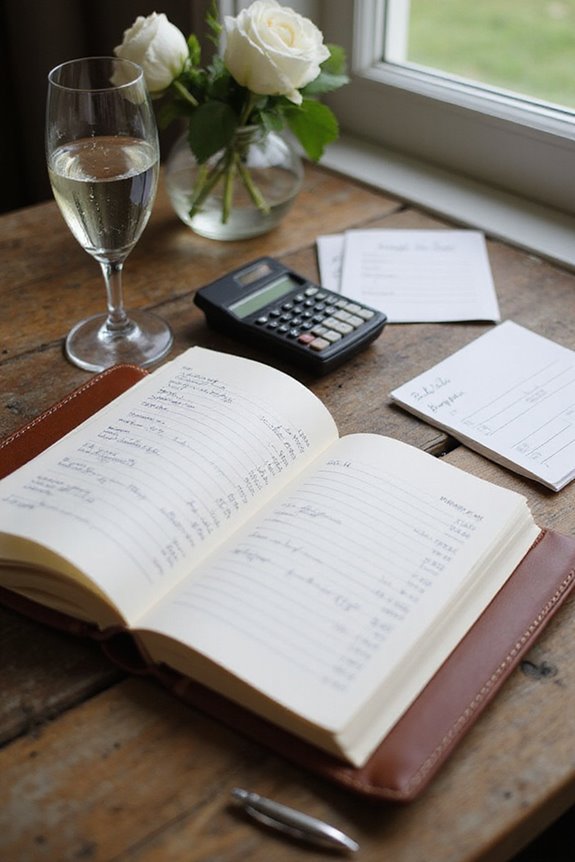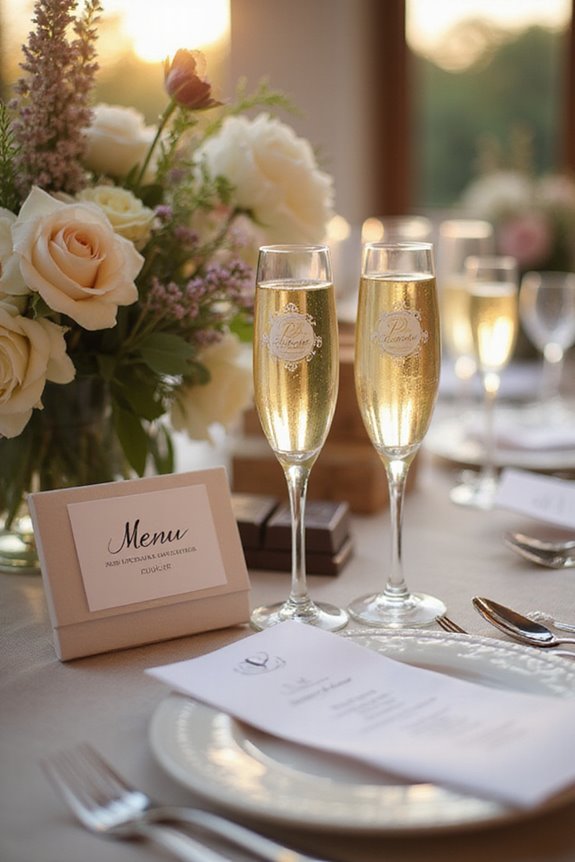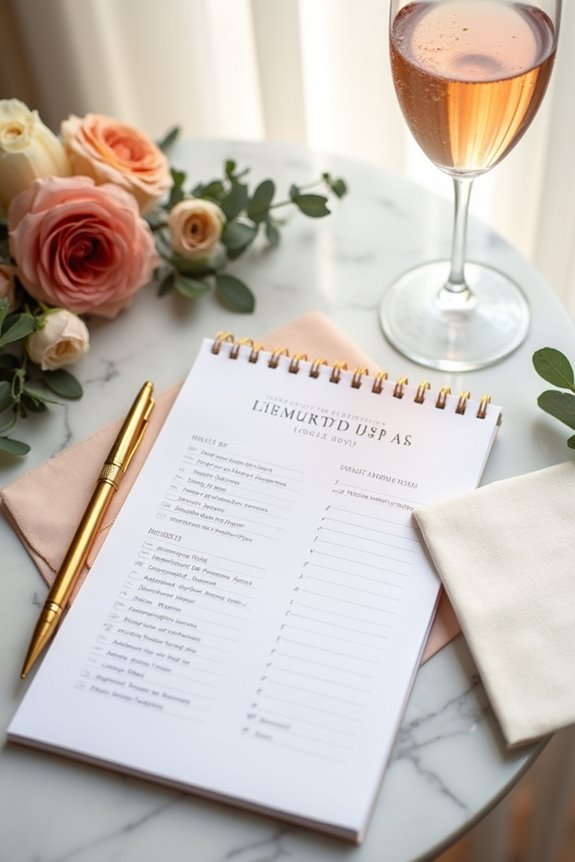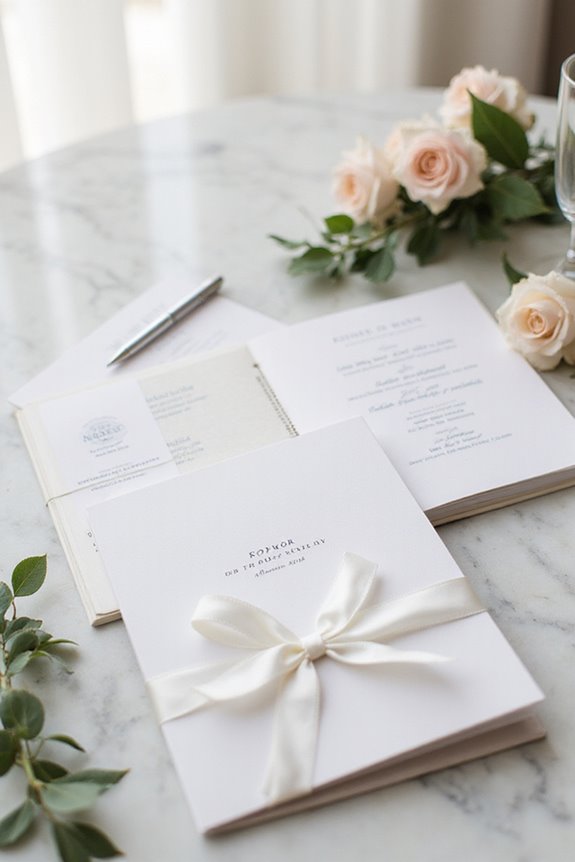Setting a realistic wedding budget starts with knowing average costs. For example, expect to spend around $36,000 for a national average. Next, assess contributions from family and prioritize your must-haves, like the venue or photographer. Trim that guest list; fewer guests mean substantial savings, especially on catering, which can be about $284 per person. Consider off-peak dates for better rates. If we keep an eye on our expenses, we can make it work—let’s explore more ways to save!
Key Takeaways
- Assess your total available funds and any contributions from family or friends to establish a clear budget.
- Prioritize essential expenses, such as venue, catering, and photography, to identify non-negotiable items.
- Create a detailed guest list to manage costs, as each additional guest increases the budget significantly.
- Track all expenses diligently using budgeting apps to ensure you stay within your set limits.
- Set aside a contingency fund of 10-15% of your total budget for unexpected costs that may arise.
Understanding Average Wedding Costs
When it comes to planning our wedding budget, it’s essential to get a grip on what we’re really looking at. Understanding average wedding costs helps us create a solid budget breakdown. In 2025, the national average is around $36,000, and that’s up from $33,000 last year! With the average guest costing about $284, our guest list can markedly impact expenses. If we want to save, cutting down from 142 guests to 100 could help. We also need to reflect on wedding cost trends, like rising venue and catering prices. Finding ways to balance our dreams with our budget isn’t always easy, but with careful planning and maybe a few compromises, we can make it work! After all, it’s about celebrating love, right? Additionally, considering affordable wedding ring options can help us allocate funds to other aspects of the wedding without compromising style.
Geographic and Demographic Variations
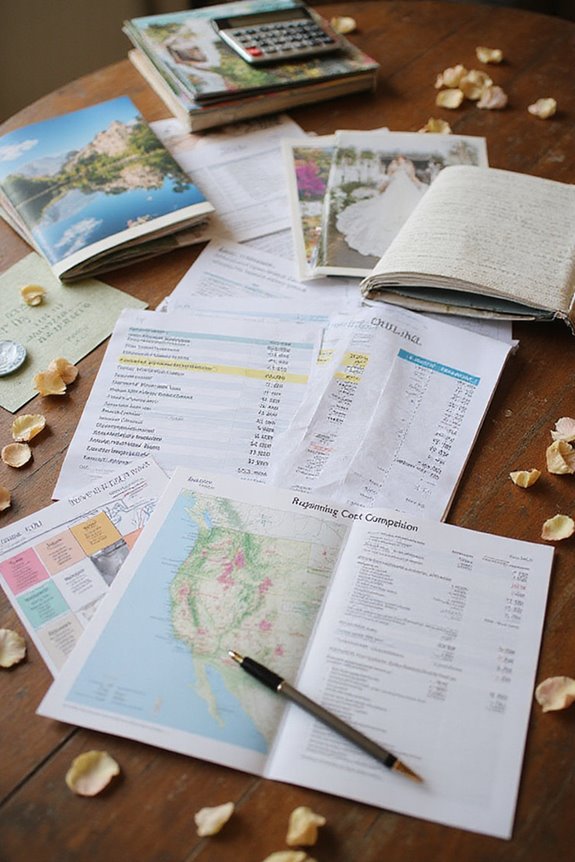
While planning our wedding, it’s important to recognize that the costs can vary dramatically based on where we live and who we’re inviting. For instance, states like New Jersey and New York can have weddings averaging around $51,000, while places like Utah and Kansas might be as low as $16,000.
Urban areas often see higher regional pricing due to demand, so if we’re in a city, we might want to explore rural options for better deals.
Income disparities also play a role; wealthier regions tend to have higher budgets. If we’re in a pricier area, we could consider trimming our guest list or choosing off-peak dates for savings. Remember, it’s our day—let’s budget smartly and celebrate happily!
Key Expense Categories to Consider
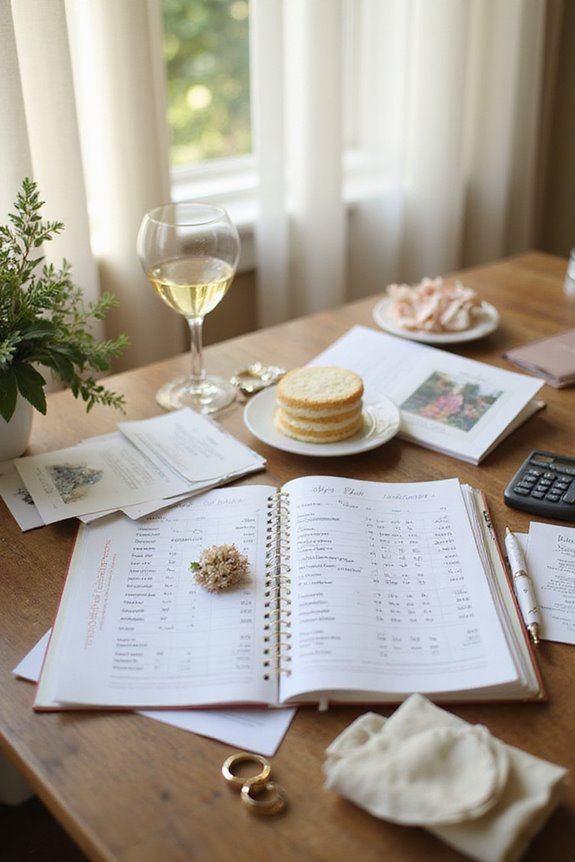
Setting a wedding budget can feel like trying to solve a puzzle with a million pieces, but it doesn’t have to be overwhelming. Start with key expense categories, and we’ll make it manageable.
Venue Selection
Venue rental often takes the biggest bite out of our budget, usually between $6,500 and $12,000. The guest count plays a huge role here—more guests mean higher catering costs, typically around $284 per person.
Attire and Accessories
Next, we should budget around 6% for attire, which includes the dress, suit, and hair.
Photography and Entertainment
Don’t forget to set aside money for photography and entertainment; they’re essential for capturing memories and keeping the dance floor alive! Additionally, consider allocating 10-15% of your total budget for planning services, which can help streamline the process and reduce stress.
Strategies for Budget Setting and Management

Creating a wedding budget doesn’t have to feel like an intimidating mission; instead, it can be a fun opportunity to plan a day that reflects who we are as a couple. First, let’s assess our total available funds and contributions from family or friends. This helps with budget allocation. Next, we should prioritize expenses—what’s non-negotiable for us? Maybe it’s the venue or photography. Don’t forget to track our expenses diligently! A dedicated app can make expense tracking a breeze. Additionally, understanding wedding budgets helps in setting realistic financial goals for our special day. Finally, let’s set aside a contingency fund for those unexpected costs that always seem to pop up. By being organized and realistic, we can enjoy our planning without stressing over money!
Practical Tips for Staying Within Budget

When it comes to keeping our wedding budget in check, we can make smart choices that don’t sacrifice our vision for the big day. First, let’s tackle guest management. A smaller guest list not only makes for a more intimate celebration but also saves us money on catering and rentals. Now, let’s explore some cost-saving ideas. Choosing an off-peak wedding date can lower venue costs considerably. We might also consider buffet-style catering or food trucks to keep dining expenses in check. Plus, renting decor and attire instead of buying can stretch our budget further. Additionally, selecting affordable wedding sets can enhance our overall savings while still achieving a luxurious look. Finally, let’s set aside a small contingency fund for unexpected costs. With these tips, we can create a beautiful wedding without breaking the bank!
Frequently Asked Questions
Can I Negotiate Prices With Vendors for My Wedding?
Yes, we can negotiate prices with vendors for our wedding. By exploring vendor flexibility and making price comparisons, we might find opportunities for added value or discounts, especially in less competitive markets.
How Do I Handle Unexpected Expenses During Planning?
As we navigate our wedding journey, think of unexpected costs as uninvited guests. Embracing budget flexibility, we can gracefully handle surprises, ensuring our celebration remains joyful and memorable without losing sight of our financial goals.
What Are Some Creative Ways to Save on Wedding Costs?
We can save on wedding costs by using DIY decorations to add personal flair and schedule our event during off-peak times to take advantage of discounts. Every little bit helps us stay within budget!
Should I Consider Wedding Insurance for My Budget?
We’ve all heard about unexpected wedding mishaps, right? Considering wedding insurance for budget protection strategies can be smart. It offers benefits like covering cancellations and vendor issues, ensuring our special day stays stress-free and secure.
How Does My Wedding Location Affect Vendor Availability?
Our wedding location greatly affects vendor availability. Venue popularity can drive seasonal demand, making early bookings essential. In urban areas, we’ll find diverse options, while rural spots may limit our choices and increase costs.

